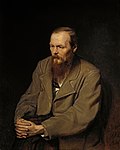Antisemitism
-
Vasily Perov - Портрет Ф.М.Достоевского - Google Art Project
Dostoevsky’s anti-semitism is not something one finds blatantly obvious in his earlier works. In fact, when Dostoevsky and his brother Mikhail founded a journal, their magazine supported greater tolerance for the integration of the Jewish population in Russia (who before were forced to live in segregated parts of the country). Despite this, he was accused of being an anti-semite due to statements found in his novels and other works. This led him to vehemently deny being an anti-semite in his March 1877 entry of A Writer’s Diary. However, in this very same entry, he states:
“Granted, it is very difficult to learn the forty centuries of history of a people such as the Jews; but one initial thing I do know is that certainly no other people in the whole world have complained so much about their fate, complained constantly, at their every step and every word, about their oppression, their suffering, their martryrdom. One would think that it is not they who rule in Europe, not they who at least control the stock exchanges there and, accordingly, the policy, the internal affairs, and the morality of the states.”
Dostoevsky’s work is characterized by sensitivity to human suffering, however this sensitivity is not expressed towards the Jewish population. Evidence towards Dostoevsky’s anti-semitism can predominantly be shown through his written works, even unpublished works that we know little of, such as The Jew Yankel. Dostoevsky only briefly mentions this work in a letter in 1844, however there is nothing known about it except for the name. However, The Jew Yankel is a character found in Taras Bulba, a novel by Gogol. The Jew Yankel is portrayed as a pathetic coward, who only cares about himself and money. It then became a stereotype for Jewish characters in Russian literature, so it can be implied that Dostoevsky would follow that very same stereotype.
In one of Dostoevsky’s most famous novels, Crime and Punishment, the topic of anti-semitism is hardly mentioned, but there is still a Jewish character featured in the novel who is described in an antisemitic way. This is during the scene where Svidrigailov commits suicide, which was committed in front of a Jewish fireman, who was described as having a “look of eternal peevish affliction that is so sourly imprinted on all the faces of the Jewish tribe without exception.”
Finally, in his later works, such as a Writer’s Diary, especially in the the March 1877 Volume chapter, titled The Jewish Question, his anti-semitism begins to become flagrant and obvious, as shown by the quotation above. Therefore, despite his denials, it is still obvious to see that there is still anti-semitism apparent in not only in his mind set and his personality but in his works as well.
